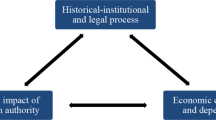
Access this book
Tax calculation will be finalised at checkout
Other ways to access
About this book
A new economic theory, rather than a new public policy based on old theory, is needed to guide humanity toward sustainability. Institutions are a critical dimension of sustainability and sustainable forest management, and economic analysis of institutional dimension requires an inclusionist rather than an exclusionist approach. This book provides a systematic critique of neoclassical economic approaches and their limitations with respect to sustainability. Leading institutional economists discuss theoretical perspectives about appropriate institutions for sustainable forest management, markets for environmental services, deforestation and specialization, and some country experiences about Kyoto Protocol, international trade, biodiversity conservation, and sustainable forest management in general. The book includes the ideas from old as well as new institutional economics and discusses the main features of Post-Newtonian economics.
This book follows a companion book, Economics, Sustainability, and Natural Resources: Economics of Sustainable Forest Management, volume 1 of the series.
Similar content being viewed by others

Keywords
Table of contents (15 chapters)
-
Front Matter
-
Back Matter
Editors and Affiliations
Bibliographic Information
Book Title: Institutions, Sustainability, and Natural Resources
Book Subtitle: Institutions for Sustainable Forest Management
Editors: Shashi Kant, R. Albert Berry
Series Title: Sustainability, Economics, and Natural Resources
DOI: https://doi.org/10.1007/1-4020-3519-5
Publisher: Springer Dordrecht
eBook Packages: Business and Economics, Economics and Finance (R0)
Copyright Information: Springer Science+Business Media B.V. 2005
Hardcover ISBN: 978-1-4020-3479-4Published: 06 September 2005
Softcover ISBN: 978-90-481-6878-1Published: 28 October 2010
eBook ISBN: 978-1-4020-3519-7Published: 17 January 2006
Series ISSN: 1871-6121
Edition Number: 1
Number of Pages: XVIII, 362
Topics: Environmental Economics, Business and Management, general, Forestry, Law and Economics, Forestry Management



